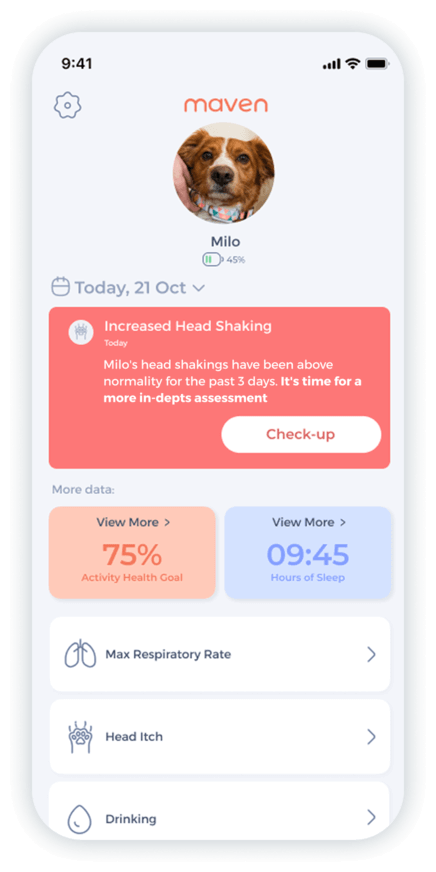Heart Murmur in Dogs: Causes, Stages & Treatment (Vet Verified)
Heart murmurs in dogs are more common than many pet parents realize, showing up in about 6 to 12 percent of dogs. The comforting news is that a lot of these murmurs are what veterinarians call physiological or innocent, meaning they don’t point to heart disease and usually don’t cause any trouble. But sometimes, a murmur can be pathological, which means it’s linked to an underlying heart condition such as congenital heart disease or another cardiac problem. In this article, we’ll unpack what a heart murmur really means for your dog, what can cause it, how vets diagnose it, and the treatment options that can help your pup live a happy, healthy life.
Key takeaways:
- Heart murmurs in dogs are common and often harmless, but some indicate the presence of underlying heart disease.
- Vets classify murmurs by grade (loudness) and stage (disease progression).
- Common causes include valve disease, vessel narrowing, and congenital defects.
- Early diagnosis through vet exams and imaging is crucial.
- Tools like Maven Pet help track heart rate trends and detect early warning signs.
What Is a Heart Murmur in Dogs?

A heart murmur is that unusual sound we hear when we listen to the dog’s heart. The vet only needs a stethoscope to hear that whooshing or swishing sound and determine if the heart murmur is there or not. Heart murmurs aren’t diseases on their own. There are clinical studies that find them to be completely harmless, but they can also indicate an underlying heart condition. The vets classify them into two major groups:
- Congenital murmurs: These are present from birth and usually result from structural defects in the heart, like a tiny hole in a wall or an unusual connection between blood vessels. They’re often picked up in puppies and can range from mild and harmless to more serious.
- Acquired murmurs: These develop later in life, often in middle-aged or senior dogs. The most common causes are valvular heart disease (when the heart valves become thickened or leaky) or cardiomyopathy, where the heart muscle weakens or changes shape over time.
A heart murmur is your dog’s heart whispering that it deserves a closer listen. The next step is figuring out whether it’s just a harmless quirk or something that needs a bit more attention.
What Causes Heart Murmurs in Dogs?
Essentially, a murmur happens when blood doesn’t flow smoothly through the heart or its major vessels. That turbulence creates the extra “whooshing” sound your vet hears.
Here are some of the most common reasons this can happen.
Diseases of the Heart Valves
Heart valves act as one-way gates, keeping blood moving forward. When a valve becomes weak or doesn’t close properly, some blood leaks backward, creating turbulence and a murmur. The most common cause is myxomatous mitral valve disease (MMVD), which is often seen in small breeds, such as Cavalier King Charles Spaniels.
Narrowing of Blood Vessels (Stenosis)
If a valve or blood vessel becomes narrowed, the heart must pump blood through a smaller space at higher pressure. This extra effort produces a murmur. Common examples include aortic stenosis and pulmonic stenosis, which can be inherited in certain breeds.
Congenital Heart Defects
Congenital heart defects are structural heart problems that some dogs are born with. These include ventricular septal defects (VSD), small holes between heart chambers, and patent ductus arteriosus (PDA), a blood vessel that fails to close after birth. Such defects often cause murmurs that are detected in puppies during early checkups.
Innocent (Physiological) Murmurs
Young puppies sometimes develop harmless murmurs simply because blood moves quickly through their small, growing hearts. These innocent murmurs usually disappear by six months of age and don’t require treatment.
Other Causes
Occasionally, murmurs may appear due to conditions outside the heart, such as anemia, fever, or thyroid disease. These functional murmurs tend to fade once the underlying issue is resolved.
“I got the Maven sensor for my 14-year-old Chihuahua mix with heart and trachea issues. It gave me back peace of mind – I can track her RRR, BPM, drinking, and activity anytime and know instantly if something’s wrong. Highly recommend!”

★★★★★
Chiara De Luca
Titti
Heart Murmur in Dogs: Grades and Stages Explained
Veterinarians usually categorize heart murmurs based on their intensity and the degree to which they affect your dog’s health. Let’s start with the grades first:
Grades: How Loud Is the Murmur
The grade describes how strong or loud the murmur sounds through a stethoscope. It’s ranked on a scale from 1 to 6:
- Grade 1: Very soft and barely audible. Often only heard in a quiet room.
- Grade 2: Soft but easy to detect once you know where to listen.
- Grade 3: Moderately loud and clearly heard.
- Grade 4: Loud, often heard on both sides of the chest.
- Grade 5: Very loud, with a vibration (called a “thrill”) that can be felt through the chest wall.
- Grade 6: Extremely loud, with a thrill and sometimes audible even without a stethoscope
Note that the loudness doesn’t always indicate the severity of the condition, so it’s crucial that you discuss this with the vet.
Stages: How Far the Disease Has Progressed
The stage tells your vet how much the murmur or underlying heart disease is jeoperdizing your dog’s health. Usually, there are four stages:
- Stage A: Dogs at risk of heart disease but with no current signs or murmur.
- Stage B: Dogs with a murmur but no symptoms
- Stage B1: Murmur present, but the heart isn’t enlarged.
- Stage B2: Murmur present and the heart is enlarged, though the dog still shows no symptoms.
- Stage C: Heart disease has progressed, and the dog is showing symptoms such as coughing, tiredness, or difficulty breathing.
- Stage D: Advanced or end-stage heart disease that no longer responds well to standard treatments.
Symptoms to Watch For

The symptoms of heart murmur can vary based on the stage of the disease, the dog’s breed, and overall health. Here are the most common ones:
- Coughing
- Labored breathing (even at rest)
- Tiring easily
- Reduced stamina
- Restlessness at night
- Bluish gums or tongue
- Weight loss
- Decreased appetite
If you notice any of these signs, especially if they are backed with data from a pet health tracker it’s best to schedule a check-up with your veterinarian as soon as possible.
How to Treat a Heart Murmur in Dogs
The treatment of a heart murmur depends on the stage of the condition, the severity of the symptoms, and other factors. Remember that physiological murmurs are not treated at all as they usually get fixed with age. Otherwise, the following treatments may be applied:
- Medications (diuretics, ACE inhibitors, beta-blockers)
- Surgery (in extreme conditions of structural defects)
- Changes in the dog’s diet
- Regular check-ups
When to See a Vet and What to Expect During Diagnosis
“A heart murmur doesn’t always mean heart disease — it’s a clue that your vet needs to investigate further. Early monitoring makes a big difference in long-term outcomes.” — Joana Babo, DVM, Veterinarian at Maven Pet
If your dog shows symptoms like coughing, fatigue, or changes in breathing, and you have a breed that’s prone to heart murmurs, like a Boxer or Chihuahua, you should book an appointment with the vet.
The doctor will first perform a physical examination by listening to your dog’s heart. If they hear a murmur, then the following diagnostic tests are in order:
- Echocardiogram (cardiac ultrasound)
- Chest X-ray
- Electrocardiogram (ECG or EKG)
- Blood pressure measurement
- Blood and thyroid tests
After that, it may be the right time to consult a veterinary cardiologist for advanced testing.
How Maven Pet Helps Track Cardiac Health and Early Signs of Trouble
For dogs with heart murmurs or those at risk, Maven Pet’s pet health app offers an easy way to keep tabs on heart health between vet visits.
Maven automatically records your dog’s resting heart rate, compares it to their normal range, and highlights any unusual days. It also shows weekly and monthly trends, helping you spot whether things are steady, improving, or changing over time.


Monitor heart rate, respiratory rate, activity & rest, drinking, itch behavior.
Each reading from the dog health tracker includes helpful context, such as exercise level, weather, or medication changes, so you can determine if a higher heart rate is expected or warrants a closer look. If several unusual days occur, Maven recommends the next step, which starts with continued monitoring and progresses to a veterinary check if necessary.
Conclusion
A heart murmur can sound scary at first, but in many cases, it’s simply your dog’s heart asking for a little extra attention. With regular vet visits, early testing, and smart tools like Maven Pet, you can stay ahead of potential problems and give your pup the care they need.
Maven Pet focuses on improving the quality of life of our pets with technology, using artificial intelligence (AI) to enable proactive pet care. By accurately collecting and monitoring pet data 24/7 and flagging any irregularities, Maven Pet empowers pet parents and veterinarians to stay ahead of potential health issues, ensuring the well-being and longevity of our beloved companions.




